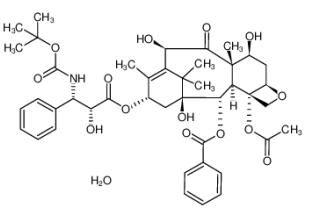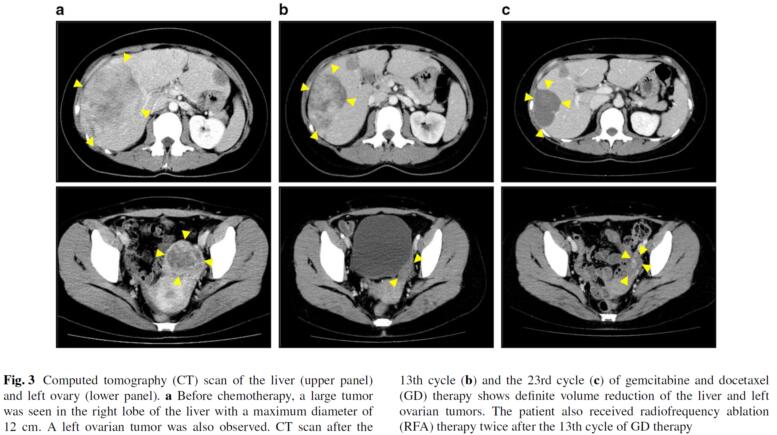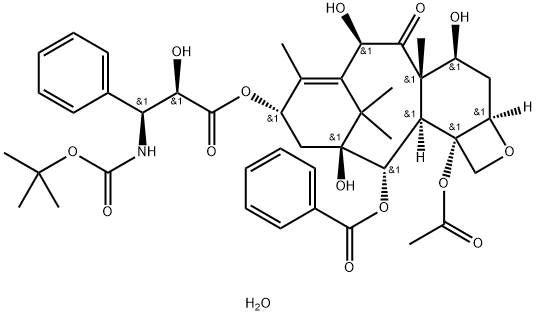What is Docetaxel trihydrate?
Feb 10,2020

Docetaxel (Taxotere®), a cytotoxic taxane, is an antimicrotubule agent effective in the treatment of patients with breast cancer.
Docetaxel principally exerts its cytotoxic activity by promoting and stabilising microtubule assembly while simultaneously preventing microtubule depolymerisation. This results in inhibition of normal cell division. In vitro and in vivo, docetaxel has antineoplastic activity against a wide range of cancer cells, demonstrates synergistic activity with several antineoplastic agents and often has greater cytotoxic activity against human breast cancer cell lines than paclitaxel. Docetaxel, binds to and stabilizes tubulin, which prevents physiological microtubule depolymerization/disassembly and results in cell-cycle arrest at the G2/M phase and cell death. This agent also is known to inhibit the anti-apoptotic gene Bcl2 and to encourage the expression of p27, a cell-cycle inhibitor, and further pro-angiogenic factors such as vascular endothelial growth factor (VEGF). Docetaxel is mainly metabolized in the liver by the cytochrome P450 CYP3A4 and CYP3A5 subfamilies of isoenzymes, and its clearance has been shown to be related to body surface area and hepatic enzyme and alpha1 acid glycoprotein plasma levels.[1]
The pharmacokinetics of docetaxel are linear at clinically relevant doses and are consistent with a three-compartment model. Docetaxel is highly bound to plasma proteins, but has a large volume of distribution at steady state. It is primarily metabolised by the cytochrome P450 3A4 isoenzyme and is excreted primarily faecally via the biliary tract. Clearance of the drug is a strong independent predictor of severe haematological toxicity in cancer patients. [2]
The tolerability of docetaxel in comparative clinical trials was generally acceptable. Severe neutropenia affects most docetaxel recipients, with febrile neutropenia occurring in approximately one-eighth of patients. Dose-cumulative severe fluid retention was reported in docetaxel recipients, despite premedication with prophylactic corticosteroids. Other adverse events include asthenia, stomatitis, infections, neurosensory, cutaneous or gastrointestinal events, nail changes, severe fever in the absence of infection, myalgia and hypersensitivity reactions. [3]

In all, docetaxel is an effective option in the treatment of patients with metastatic breast cancer after failure of prior chemotherapy. [4]
References
1.He M, Deng YJ, Zhao DY et al. Synchronous leiomyosarcoma and fibroma in a single ovary: a case report and review of the literature[J]. Oncol Lett, 2016 11:2510–2514
2.Hensley ML, Barrette BA, Baumann K et al. Gynecologic Cancer InterGroup (GCIG) consensus review: uterine and ovarian leiomyosarcomas[J]. Int J Gynecol Cancer, 2014, 24:S61-66
3.Arslan OS, Sumer C, Cihangiroglu G et al. A rare tumor of the female genital tract: primary ovarian leiomyosarcoma[J]. Arch Gynecol Obstet, 2011 283(Suppl 1):83–85
Jones RL, McCall J, Adam A et al. Radiofrequency ablation is a feasible therapeutic option in the multi modality management of sarcoma[J]. Eur J Surg Oncol, 2010, 36:477–482
You may like
Epirubicin hydrochloride: Pharmacodynamic,Pharmacokinetic Properties and its application
Dec 15, 2025
Pharmacological research of AICAR
Nov 19, 2025
Lastest Price from Docetaxel trihydrate manufacturers
Docetaxel·Trihydrate

US $0.00-0.00/kg2025-06-13
- CAS:
- 148408-66-6
- Min. Order:
- 1kg
- Purity:
- 99.99%
- Supply Ability:
- 2000kgs
Docetaxel trihydrate

US $5.00-0.50/KG2025-06-07
- CAS:
- 148408-66-6
- Min. Order:
- 0.10000000149011612KG
- Purity:
- 99% hplc
- Supply Ability:
- 5000kg


